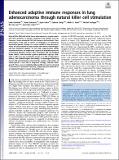| dc.contributor.author | Schmidt, Leah Marie | |
| dc.contributor.author | Eskiocak, Banu | |
| dc.contributor.author | Kohn, Ryan | |
| dc.contributor.author | Dang, Celeste | |
| dc.contributor.author | Joshi, Nikhil | |
| dc.contributor.author | DuPage, Michel J. | |
| dc.contributor.author | Lee, Da-Yae | |
| dc.contributor.author | Jacks, Tyler E | |
| dc.date.accessioned | 2020-06-25T18:10:33Z | |
| dc.date.available | 2020-06-25T18:10:33Z | |
| dc.date.issued | 2019-08 | |
| dc.date.submitted | 2019-03 | |
| dc.identifier.issn | 0027-8424 | |
| dc.identifier.issn | 1091-6490 | |
| dc.identifier.uri | https://hdl.handle.net/1721.1/125983 | |
| dc.description.abstract | Natural killer (NK) cells inhibit tumor development in mouse models and their presence in tumors correlates with patient survival. However, tumor-associated NK cells become dysfunctional; thus, stimulation of NK cells in cancer is emerging as an attractive immunotherapeutic strategy. In a mouse model of lung adenocarcinoma, NK cells localized to tumor stroma with immature phenotypes and low functional capacity. To test their responsiveness within established disease,we engineered a system for inducible expression of activating ligands in tumors. After stimulation, NK cells localized inside tumors, with increased cytokine production capacity. Strikingly, T cells were also recruited to tumors in an NK cell-dependent manner, and exhibited higher functionality. In neoantigen-expressing tumors, NK cell stimulation enhanced the number and function of tumor-specific T cells and, in long-term settings, reduced tumor growth. Thus, even in established disease NK cells can be activated to contribute to antitumor immunity, supporting their potential as an important target in cancer immunotherapy. | en_US |
| dc.description.sponsorship | National Institutes of Health (Grant U54 CA126515-01) | en_US |
| dc.description.sponsorship | National Institutes of Health (Grant R01-CA185020-01) | en_US |
| dc.language.iso | en | |
| dc.publisher | National Academy of Sciences | en_US |
| dc.relation.isversionof | http://dx.doi.org/10.1073/pnas.1904253116 | en_US |
| dc.rights | Article is made available in accordance with the publisher's policy and may be subject to US copyright law. Please refer to the publisher's site for terms of use. | en_US |
| dc.source | PNAS | en_US |
| dc.title | Enhanced adaptive immune responses in lung adenocarcinoma through natural killer cell stimulation | en_US |
| dc.type | Article | en_US |
| dc.identifier.citation | Schmidt, Leah et al. "Enhanced adaptive immune responses in lung adenocarcinoma through natural killer cell stimulation." Proceedings of the National Academy of Sciences 116, 35 (August 2019): 17460-17469 © 2019 National Academy of Sciences | en_US |
| dc.contributor.department | Massachusetts Institute of Technology. Department of Biology | en_US |
| dc.contributor.department | Koch Institute for Integrative Cancer Research at MIT | en_US |
| dc.relation.journal | Proceedings of the National Academy of Sciences | en_US |
| dc.eprint.version | Final published version | en_US |
| dc.type.uri | http://purl.org/eprint/type/JournalArticle | en_US |
| eprint.status | http://purl.org/eprint/status/PeerReviewed | en_US |
| dc.date.updated | 2019-12-10T18:41:31Z | |
| dspace.date.submission | 2019-12-10T18:41:33Z | |
| mit.journal.volume | 116 | en_US |
| mit.journal.issue | 35 | en_US |
| mit.metadata.status | Complete | |
